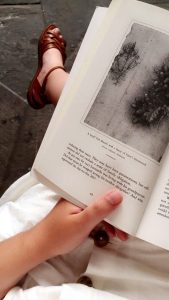I grew up on the west coast, moving from California to Idaho, then back, then back again, and for the past two years I have been attending university all the way across the country in Washington, D.C. I’m no stranger to homesickness, to missing old haunts and familiar faces. By this point, I thought I was so used to it that it never even occurred to me that homesickness might affect me abroad — I was excited to live in Italy and immerse myself in totally new surroundings, and I didn’t expect it to be much different than any of the other times I’d moved somewhere new. Besides, it’s only for four months, right?
I think students studying abroad start to feel guilty when they get homesick. There’s pressure from the moment you arrive to blend in with the local population, to immerse yourself so completely that you become a local yourself, and have the greatest experience of your life with no hitches at all in the transition. The truth is, we don’t leave behind our own cultural identities when we travel, even if we are striving to be students in every sense by opening ourselves up to new ideas and experiences. It’s only natural to miss what you know. Thankfully, I’ve found ways to use my homesickness as a tool to help me enjoy my abroad experiences even more.

Florence as seen from the Piazzale Michelangelo
1. Reflect more deeply on why you’ve chosen to study abroad. There has to be a reason you chose to put in the time and energy to apply for your abroad program and take the leap to leave the country. Whatever that initial motivation was, look for it again. Why did you pick your city? What experiences did you picture yourself having? What was exciting about your classes, and what were you hoping to learn outside of them? For me, the motivation was being able to study history in the hub of the Renaissance, to walk the same streets as Leonardo da Vinci and Michelangelo and know what inspired them. To remind myself of why that was important to me, I would carry my books to the Piazza Signoria or the Boboli Gardens and study there. I set aside a day every week to visit a historic site or work of art and just meditate on its importance, to the world and to me. Reminding yourself what inspired you to be where you are can help reconnect you to what you feel is your purpose in your new country.

Santa Maria del Fiore is one of the most beautiful and familiar sights in Florence
2. Take some “me time”. The first weeks of study abroad are a hectic mess of readjustments and networking, and they can get overwhelming. To avoid getting lost in the strangeness of new surroundings and new people, I think it’s important to take a step back and interact with your new city on your own terms. This isn’t to say you should isolate yourself — by all means, inviting new friends on outings to explore your community together is super fun and eye-opening — but it’s important to know that you can be independent no matter where you are.

Being able to study in Florence’s historic squares and gardens is an incredible study abroad experience.
3. Establish new routines. Studying abroad is a fantastic opportunity to break out of your comfort zone, but that doesn’t mean you should be totally uncomfortable either. Figuring out new routines is a chance to add stability to your life abroad and to interact with your community. You shouldn’t let yourself fall into a rut, but there’s no harm in being able to relax in a familiar cafe, get to know the family running a nearby lunch spot, or set aside reading time in a local library. On you have some regularity in your life to fall back on, every new adventure feels less intimidating and more exciting.

Statues like Leonardo da Vinci line the exterior of the Uffizi Gallery
4. Get involved with the local community. There are so many ways to get to know your home country, and getting to know the community you’re living in for the next few months is a great first step! Maybe there’s something you loved to do back home that you’d like to continue doing, or something new you’ve always wanted to try but never got around to starting. Whether it’s volunteering at a community garden or getting involved with your host university’s student publication, having a relationship with your new community is a great way to feel connected to the people around you and can often become the highlight of your abroad experience.

The Arno River
5. Visit your SAI office. The best part about being part of SAI is all of the great opportunities and knowledge they have to offer every student. SAI provided us with weekend excursions, cooking classes, and local tours, as well as answers to all of our questions about our study abroad city. Getting to know your local SAI staff can be your key to adjusting to study abroad!
—
Adelle is a Fall 2017 SAI Florence student from George Washington University.


Comments
No comments yet